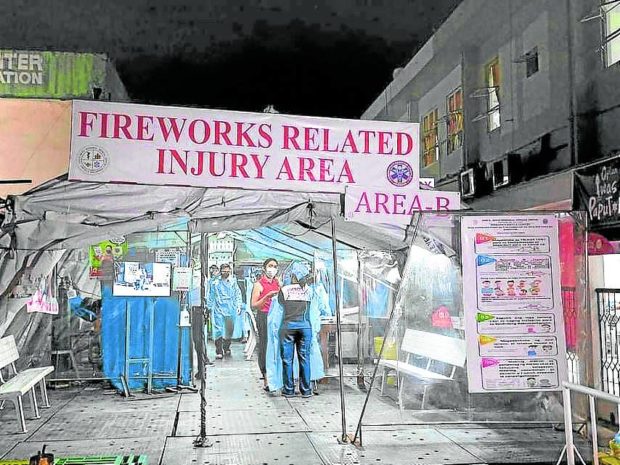PNP begins the inspection of firecracker stores nationwide

READY FOR THAT OTHER ‘SURGE’ An area at Jose Reyes Memorial Medical Center in Manila has been set up on New Year’s Eve to treat people injured by firecrackers. (File photo from PTV)
MANILA, Philippines — Law enforcers have begun inspecting store selling firecrackers to prevent the sale of illegal pyrotechnics.
This campaign is in time for the holiday season, especially New Year.
Philippine National Police Firearms and Explosives Management Division head Colonel Al Abanales said they are supervising a team of policemen who are conducting the inspections since Tuesday.
“Kahapon, may isang team na nag-start na mag-conduct ng inspection hanggang sa matapos ang pag celebrate natin ng 2023 yuletide season,” Abanales said in a press briefing on Wednesday.
(Yesterday, a team started conducting the inspection that will go on until we finish celebrating the 2023 yuletide season.)
Article continues after this advertisement“Hindi lang po FEO ang mag-supervise kundi pati na rin po yung ating regional civil security units nationwide,” he noted.
Article continues after this advertisement(It is not just the FEO but also our regional civil security units nationwide that supervise the inspections.)
The police official said the list of prohibited firecrackers remains the same as in the previous years.
The banned items include piccolo, watusi, giant whistle bomb, giant bawang, large judas belt, super lolo or thunder lolo, atomic bomb, atomic big triangulo, pillbox, boga, kwiton, Goodbye Earth, Goodbye Bading, Goodbye De Lima, Goodbye Napoles, Goodbye Philippines, Coke-in-Can, and other unlabeled and imported firecrackers.
Abanales explained firecrackers with more than 1/3 teaspoon or .2 grams of net explosive content and the oversized pieces like super lolo and giant whistle bombs are banned for sale and use.
Among the firecrackers allowed for sale are butterfly, fountain, jumbo regular and special, roman candle, sparklers, trompillo, luces, Mabuhay and whistle devices.
Under Republic Act 7183, a person who “manufactures, sells, distributes or uses” prohibited firecrackers will be punished by a fine “not less than P20,000 nor more than P30,000.”
The law violator may face imprisonment of not less than six months or more than one year.